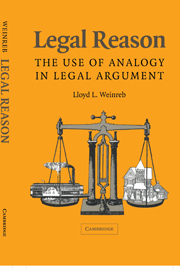Book contents
- Frontmatter
- Contents
- Preface
- Introduction
- 1 Analogy and Inductive and Deductive Reasoning
- 2 Steamboats, Broadcast Transmissions, and Electronic Eavesdropping
- 3 Analogical Legal Reasoning
- 4 Analogical Reasoning, Legal Education, and the Law
- Appendix A Note on Analogical Reasoning
- Appendix B Biographical Notes
- Notes
- Index
Preface
Published online by Cambridge University Press: 05 June 2012
- Frontmatter
- Contents
- Preface
- Introduction
- 1 Analogy and Inductive and Deductive Reasoning
- 2 Steamboats, Broadcast Transmissions, and Electronic Eavesdropping
- 3 Analogical Legal Reasoning
- 4 Analogical Reasoning, Legal Education, and the Law
- Appendix A Note on Analogical Reasoning
- Appendix B Biographical Notes
- Notes
- Index
Summary
Recent discussions of the use of analogy in legal argument, which measure its use against the standards of deductive and inductive reasoning and find it wanting, prompted me to write this book. Even those who have approved the use of analogical argument in the law, like Edward Levi in his classic study, An Introduction to Legal Argument, have thought it is rationally “flawed,” although how in that case it could have the benign effects that Levi and others attribute to it is not explained. So also, efforts to reconstruct analogical legal argument as only a slightly disguised form of deductive or inductive argument, or some combination of the two, distort the arguments that lawyers and judges actually make and are evidently dictated only by the conviction that otherwise the arguments are invalid and entitled to no weight.
Views of this kind, which have dominated the discussion about analogical legal reasoning, fly in the face of the indubitable fact that the use of analogy is at the very center of legal reasoning, so much so that it is regarded as an identifying characteristic not only of legal reasoning itself but also of legal education. It is simply not credible that arguments subjected routinely to the closest scrutiny would contain such fundamental error. Studying the matter, I confirmed my belief that the use of analogical argument in law stands up on its own terms and is not different from the reasoning on which we all rely in the affairs of everyday life.
- Type
- Chapter
- Information
- Legal ReasonThe Use of Analogy in Legal Argument, pp. vii - viiiPublisher: Cambridge University PressPrint publication year: 2005

